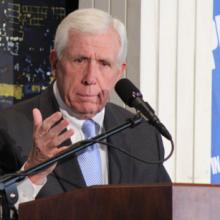Congress
How partisan and unproductive is the current Congress?
The epitome of its dysfunction may have arrived with last week’s wrap-up before a five-week summer recess, as House Republicans failed to pass their own scaled-back bill on the border children crisis on Thursday. Realizing how bad that looked, lawmakers returned on Friday to pass an even more severe bill that had no chance of going anywhere.
But a better gauge of the problem may be the fact that despite the almost universal popularity of Pope Francis, the House of Representatives was unable to muster enough bipartisan support to pass a resolution lauding Francis’ election — nearly 18 months ago.
The bill, H.Res. 440, seems straightforward, as it aims to congratulate Francis on his March 2013 election and recognize “his inspirational statements and actions.”
Religious leaders urged President Obama and Congress to provide funding for legal assistance to unaccompanied migrant children who are in U.S. custody after fleeing violence, murder, and extortion abroad.
Multiple speakers, including United Methodist Bishop Minerva Carcano and the Rev. David Vasquez, spokesman for the Lutheran Immigration and Refugee Service, took part in a national teleconference Thursday. They then sent a petition signed by more than 3,800 people to Congress.
Yesterday was one of the craziest days in recent American political history. House Majority leader Eric Cantor fell to Tea Party economics professor David Brat in a primary upset no pundit saw coming.
While the early analysis suggested that support for immigration reform may have been what brought Cantor down, exit polling suggests his lack of attention to the concerns of his constituents and his inability to deliver on his promises were a greater factor than the immigration issue. Cantor never brought a vote on immigration to the floor and was never a strong ally on immigration.
Earlier on Tuesday, the Public Religion Research Institute (PRRI) released an immigration poll at the Brookings Institute. Nearly 80 percent of all Americans and nearly two-thirds of white evangelical Protestants remain in support of immigration reform that includes a path towards citizenship or legal status.
On Friday, Eliseo Medina, a prominent immigration rights activists was arrested after trying to peacefully deliver a letter to Congressman Mario Diaz-Balart (R-FL) district office. Eliseo, who is part of the “Fast for Families Across America” bus tour advocating for Congressional action on fair and commonsense immigration reform was denied entrance by local police into the Congressman’s public office.
The arrest comes on the heels of constructive meetings with Minority Leader Nancy Peolosi and Rep. Joe Garcia in Miami.
Read detailed events here.
ON NOV. 5, 2013, the people of SeaTac, Wash., enacted the highest minimum wage in the country, $15 an hour, more than double the federal minimum wage of $7.25 an hour.
On Black Friday, the biggest shopping day of the year, Wal-Mart workers at more than 1,500 store locations conducted protests and informational pickets. Fast-food workers in more than 100 cities protested in front of McDonalds, KFC, and Taco Bell stores, calling for wage increases.
Across the U.S., a grassroots movement is blossoming to address the extreme inequality of wealth and wages. Led by low-wage workers and bolstered by faith community leaders, this movement is shining a spotlight on the glaring disparity of wages, wealth, and opportunity.
The wealthiest 1 percent of households, those with annual incomes over $555,000, now receives more than 21 percent of all income. Meanwhile, millions of low-wage workers subsist on the federal minimum wage, which is $15,080 a year for a full-time worker. As a result, many low-wage workers depend on charity and public subsidies such as food stamps and Medicaid to survive.
If the minimum wage had kept up with inflation since 1968, it would now be $10.74, enough to boost a family of three over the federal poverty line, according to the Economic Policy Institute. If the minimum wage had increased at the pace of worker productivity, it would be $18.72 an hour today.
SEVERAL YEARS AGO, before Congress passed the Affordable Care Act, many people were clear on the need to get health care for our brothers and sisters and joined in the push to reform the delivery system for health care in this country. When it was enacted, we were thrilled that those who had such difficulty getting even the most basic care for themselves and their children would finally have some health security.
But the notorious website problems—including the crashes, the inability to access it, the insurance programs that have been canceled, and the smaller-than-expected number of people who have been enrolled—have frustrated, discouraged and sometimes challenged us. This has been complicated by political bombast and in some cases, sadly, vicious character assassinations.
As people of faith, it is important not to be swept up in these problems, but to relentlessly pursue access to health care for the 48 million people who do not have health insurance today. We also need to remember that the ACA is more than a website. Think of the millions of young adults who can now stay on their parents’ insurance and the thousands of small businesses that have received tax credits for providing insurance to their employees.
The new rules that guarantee comprehensive insurance coverage, no barriers to preventive care, no pre-existing condition limits, and no lifetime limits on coverage have already made a huge difference in the lives of many families. The portion of the law that requires insurance companies to spend 80 to 85 percent of premium revenue on actual care rather than profits or dividends to shareholders will do much to make the cost of insurance more reasonable.
Last week marked the fourth anniversary of the landmark Supreme Court case Citizens United v. Federal Election Commission. In a 5-4 ruling, the court ruled that corporations are entitled to the same free speech rights as individual humans as guaranteed under the First Amendment.
The political repercussions of Citizens United include the rise of “Super PACs” — political action committees that can raise and spend unlimited amounts of money, independent of direct campaign contributions, to influence politics. The power yielded to such corporations, as well as indiscriminate spending allowance, has deleterious effects upon our democracy.
Because money talks, big money will talk a lot louder, drowning out the voices of average Americans trying to exercise their own civic rights. Politicians are undoubtedly more apt to respond to the requests of companies that shelled out hundreds of millions of dollars on supportive campaign politics than to the needs of a college graduate or working family who donated 10 bucks. Doesn’t exactly smack of sound democratic governance.
SNAP began in 1964 when President Lyndon B. Johnson signed the Food Stamp Act as part of his unconditional “War on Poverty.” In his remarks upon signing, Johnson said: “I believe the Food Stamp Act weds the best of the humanitarian instincts of the American people with the best of the free enterprise system. Instead of establishing a duplicate public system to distribute food surplus to the needy, this act permits us to use our highly efficient commercial food distribution system.”
Johnson continued: “It is one of many sensible and needed steps we have taken to apply the power of America's new abundance to the task of building a better life for every American.”
Imagine. Fifty years ago the Food Stamp Act was viewed not as charity, but rather as an ingenious utilization of American enterprise in order to help “build a better life for every American.”
And it is genius.
The central figures in four of the planet’s largest religions – Christianity, Islam, Buddhism, and Judaism – were all once homeless. Moses was encamped in the Sinai, unable to return to the Promised Land. Jesus was born in a manger. Buddha wandered through the wilderness seeking enlightenment. The Prophet Muhammad was forced out of Mecca.
Is it a coincidence that each of these figures was, at key parts of his life, dispossessed from the society around him? Hardly. This is a clear message that even the most powerful can be made powerless.
In both Leviticus and Deuteronomy, believers are directed to give a set portion of their harvest to people in poverty and immigrants. It is neither voluntary, nor are the amounts to be based on charitable whims. It is a commandment to automatically give a specific percent, making it an anti-hunger tax of sorts. In fact, both the Old and New Testaments make it clear that justice is a higher calling than mere charity.
In Mathew 25, not only does Christ proclaim that those who clothe, house, and feed the “least of these” are engaging in acts equivalent to directly aiding the Lord, he also preaches that those who refuse to aid the poor are consigned to damnation.
Most secular ethical traditions also make societal actions to reduce hunger, poverty, and homelessness a centerpiece of their teachings.
Virtually every elected official in Washington claims to abide by these ethical and faith-based traditions. Indeed, many have used their professions of faith to advance their political careers.
Yet many of these same leaders repeatedly take actions opposite to the values they espouse.
In only its second week in session, Congress is already confronted with difficult decisions that impact the lives of millions of people — some of whom are the most vulnerable in our society.
The Senate is faced with finding a solution that would extend the unemployment insurance to help a struggling workforce. One of the solutions, proposed by Senator Ayotte (R-NH), would penalize U.S. citizen children who are part of already struggling immigrant households living in poverty. While it’s important that Congress finds a resolution to the unemployment insurance conundrum, they should not do so by shifting the harm from one group to the next.
IT WAS LIKE the end of the movie Lincoln. In an instant, one whole side of the House of Representatives turned, looked up at the five core fasters from the Fast for Families and erupted in overwhelmingly spirited applause. The applause reverberated throughout the chamber for what seemed like an eternity, though it was really only minutes. Ah, but what grand minutes. I wept. My body, standing there in the gallery, could not contain it.
The Fast for Families: A Call for Immigration Reform and Citizenship was launched on Nov. 12 with core fasters abstaining from all food and drinking only water. Based in a tent on the National Mall, only a few hundred yards from the Capitol building, the fast was sponsored by nearly 40 church and labor organizations and garnered support from more than 4,000 solidarity fasters across the U.S. and around the world. Our goal: To move the hearts and compassion of members of Congress to pass immigration reform with a path to citizenship.
In the Capitol building on Dec. 2, during the hour before the startling ovation, Eliseo Medina (the leader of the fast, which had reached the end of its 21st day on that Monday evening), D.J. Yoon (executive director of NAKASEC, a Korean-American advocacy agency), Cristian Avila (from Mi Familia Vota), and I received House member after member who’d come to visit us in the gallery to say “thank you for your sacrifice.” All the faces and names you usually see flashed across the screen commenting on the events of the day on cable television shows—they came to us, standing in the flesh, shaking our hands, grateful and concerned for our health.
Rep. Frank Wolf, one of the loudest and most persistent voices in Congress for the right of people around the globe to practice their religions freely, will not seek an 18th term.
“As a follower of Jesus, I am called to work for justice and reconciliation, and to be an advocate for those who cannot speak for themselves,” Wolf, a Presbyterian, said in a statement Tuesday.
The Republican from Northern Virginia, who will turn 75 in January, said he will work on human rights, religious freedom, and other social issues in his retirement.
In his first Advent address, Pope Francis directed Christians to be guided by the “Magnificat,” Mary’s song of praise for the coming Christ child. She proclaims that God has “lifted up the lowly and filled the hungry with good things” (Luke 1:52-53). This past Tuesday, Pope Francis heeded his own exhortation by releasing a video message calling for an end to hunger as part of a worldwide “wave of prayer.”
Hundreds of Christian organizations across the globe participated in the “wave of prayer,” which was organized by Caritas International, a confederation of Catholic charities in the Vatican.
“We are in front of a global scandal of around 1 billion people who still suffer from hunger today,” Pope Francis said in his message. “We cannot look the other way.” The wave began at noon on the Pacific island of Samoa and proceeded west with people of faith from each subsequent time zone participating at noon their time.
Saying an opening prayer at the Nelson Mandela Memorial Service on Wednesday, in Washington, D.C. was both an honor and a blessing for me. The theme of the homily, by my good friend Rev. Dr. Allan Boesak, was “it ain’t over until God says it’s done.”
I sat there listening to those words from an African American gospel hymn in the midst of my own circumstance of being on the ninth day of a water-only fast for comprehensive immigration reform. In my weakened condition, I was grateful that I had done the opening prayer and wouldn’t have to do the closing prayer! But fasting focuses you and it made me consider how Nelson Mandela would feel about a broken immigration system that is shattering the lives of 11 million immigrants, separating parents from children, and undermining the best values of our nation.
In our nightly meeting at what is now a packed fasting tent, I could imagine Nelson Mandela there with us, telling us to never give up until we win this victory for so many vulnerable people reminding us, "it ain’t over until God says it’s done." Or, as he would tell cynical pundits and politicians, “it is always impossible until it is done.” Today, following a procession from the Capitol which will now include many members of Congress, we will go to that tent and proclaim that immigration reform is not over, and we won’t give up until it’s done.
After a decades-long standoff, Iran and the West (plus China and Russia) have signed an interim agreement to halt Iran’s nuclear program in exchange for modest sanctions relief. While some are calling it a historic breakthrough along the lines of Nixon’s visit to China, the U.S. media has been mostly skeptical. And in a rare display of bipartisanship, Congress is already looking for ways to derail the deal by passing legislation to impose new sanctions on Iran and tie the President’s hands for future negotiations. Despite the fact that President Obama has successfully passed tougher sanctions on Iran than any previous administration, the U.S. media in lockstep with Congress continue to thumb their noses at anything that resembles diplomacy when it comes to Iran. And while other U.S. allies in the region — primarily the Gulf States led by Saudi Arabia — have expressed their concerns over this deal, few Americans care about what the Saudis think. As representatives of the American people, what Congress really cares about is what Israel thinks.
That’s where things get dicey.
I live in community. What constitutes living in community means different things depending on whom you're talking to. To my 80-year-old grandmother it means that I have joined a cult. In reality, I live with my 10 fellow interns.
Together, we are all learning what it means to live and function as a cohort, how to pour the love of Christ into one another, and how to borrow strength from friends when we need it most. This includes sharing a home, sharing a budget, and sharing the last bit of ice cream that is left in the freezer.
A few nights ago during dinner sharp demands bounced from person to person. Many of our simple requests were stated as demands. Of course, when feeding 10 hungry people there is understandably a bit of an urgency to get food. But, there were no pleases and very few thank-yous.
By official estimates, 26,000 people are sexually assaulted in the U.S. military each year. That comes out to 71 people every day. It’s an epidemic that’s been widely reported in the news.
As if that weren’t bad enough, most of the assaults go unreported – only 11 percent of assault victims ended up filing reports last year (3,374). Studies show that those who do not report the assault cite fears of retaliation and a concern that nothing will be done.
Leaders in Congress are trying to change that this week with the Military Justice Improvement Act.
Right now, if a woman is sexually assaulted in the military, her case is evaluated by a commanding officer. This officer decides whether to bring the case to trial. Once it has been tried, the same commanding officer is responsible for enforcing the consequences. That’s called “convening authority.”
















